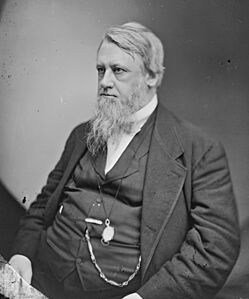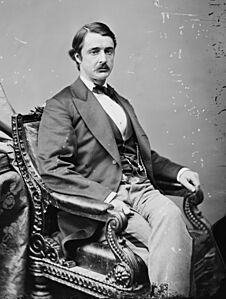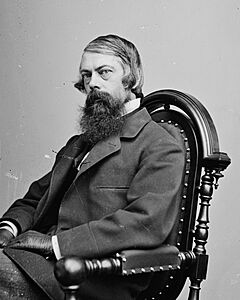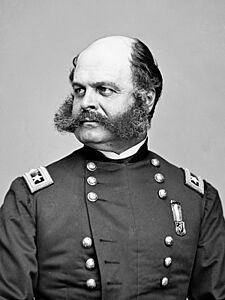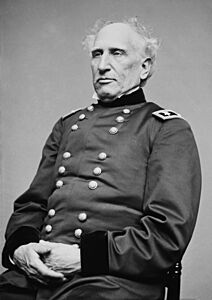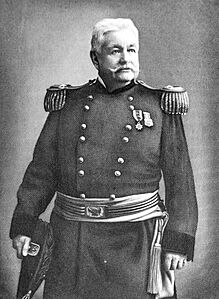Rhode Island in the American Civil War facts for kids
The state of Rhode Island played an important role during the American Civil War. It stayed loyal to the Union, just like other states in New England. Rhode Island sent over 25,000 soldiers to fight for the Union Army. Sadly, about 1,685 of these brave soldiers died.
Rhode Island was also a busy industrial state. Its factories helped the Union Army by making many of the supplies needed to win the war.
Contents
Rhode Island's Role in the Civil War
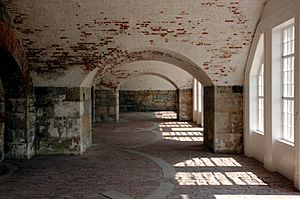
Fort Adams is a large fort near Newport. During the war, it became a temporary home for the United States Naval Academy. This school trains officers for the U.S. Navy. In 1861, the Academy moved to Newport from Maryland. This was because people worried that some Marylanders might support the Confederacy. The Academy stayed in Newport for the rest of the war.
Later, in 1862, Fort Adams became a main base for new soldiers joining the 15th U.S. Infantry Regiment. The USS Rhode Island was a special ship built in 1861. It helped the Union Navy stop ships that were trying to sneak supplies to the Confederacy. This was part of the Union blockade of Southern ports.
Important Leaders from Rhode Island
Political Leaders
Many important people from Rhode Island helped lead the state and country during the war.
Senator Henry B. Anthony was born in Coventry, Rhode Island. He owned a powerful newspaper. He strongly supported President Abraham Lincoln and the Union's goals during the war.
Another Senator from Rhode Island was Samuel G. Arnold of Providence. He was also a Republican. Senator Arnold even served in the Union Army for a while. He then became a Senator in 1862.
William Sprague IV was the Governor of Rhode Island. He even went with troops to the First Battle of Bull Run in 1861. He supported Lincoln's Emancipation Proclamation, which declared many enslaved people free. Governor Sprague was later elected as a Senator in 1863.
Other governors who led Rhode Island during the war included William C. Cozzens in 1863 and James Y. Smith, who served during the last two years of the conflict.
-
Senator Henry B. Anthony
-
Governor William Sprague IV
-
Senator Samuel G. Arnold
Military Heroes
Rhode Island was also home to many brave military leaders.
Ambrose Burnside was a general from Rhode Island. He commanded the large Army of the Potomac. However, he faced a tough defeat at the Battle of Fredericksburg in 1862. He later led other important army groups.
Major General Silas Casey was from East Greenwich, Rhode Island. He led a division of soldiers in 1862. He also wrote important books called System of Infantry Tactics. These books taught soldiers how to fight and were used by both sides during the war.
Isaac P. Rodman was a general who fought bravely. He helped capture a mountain pass during the Battle of South Mountain in 1862. A few days later, he was badly wounded at the Battle of Antietam and sadly died.
Brigadier General Richard Arnold was the son of a former Rhode Island Governor. He was a chief artillery officer. His powerful cannons helped the Union capture important cities like Mobile, Alabama and Port Hudson, Louisiana.
Zenas Bliss from Johnston, Rhode Island led an infantry group. After the war, he received the Medal of Honor. This is the highest award for bravery in the U.S. military. He earned it for his courage at Fredericksburg.
George S. Greene from Apponaug, Rhode Island was a hero at the Battle of Gettysburg in 1863. He helped defend a key position called Culp's Hill. This helped save the Union's right side during the battle.
Brigadier General Thomas W. Sherman of Newport, Rhode Island commanded defenses in New Orleans, Louisiana. He later lost a leg in battle. Frank Wheaton of Providence led soldiers in many important battles. His troops even helped protect Washington, D.C. from an attack in 1864.
William Rogers Taylor was a Fleet Captain in the Navy. He helped attack Confederate forts protecting Charleston, South Carolina. He also commanded a ship called the Juniata and helped capture Fort Fisher, North Carolina.
-
Major General Silas Casey
 | Charles R. Drew |
 | Benjamin Banneker |
 | Jane C. Wright |
 | Roger Arliner Young |


